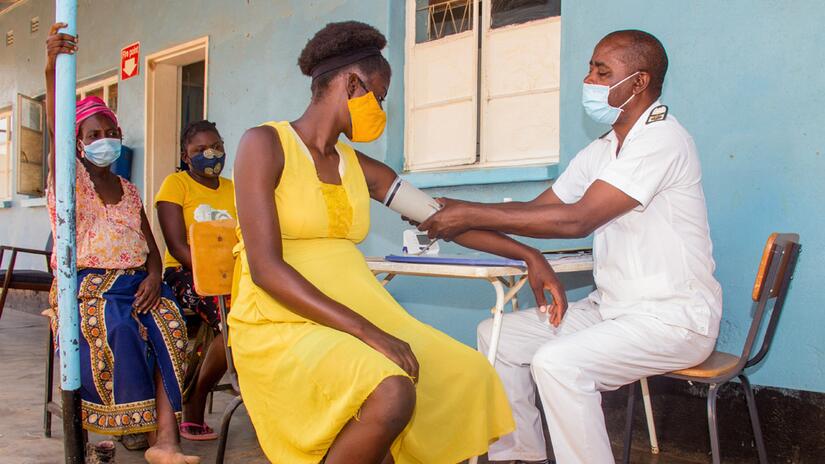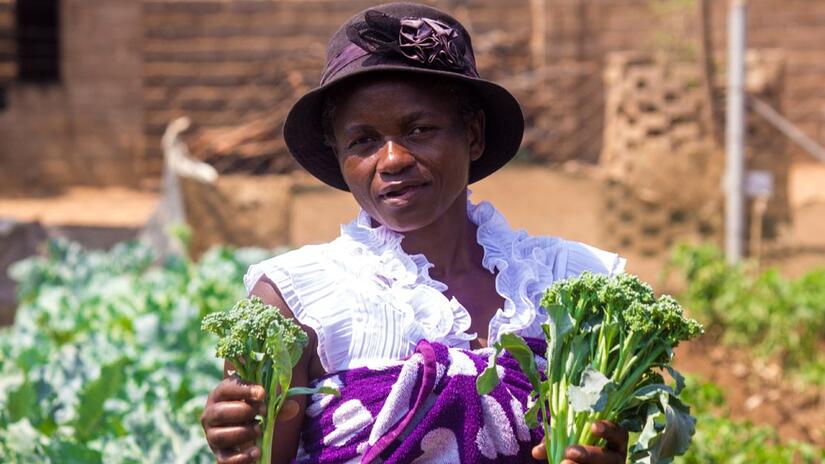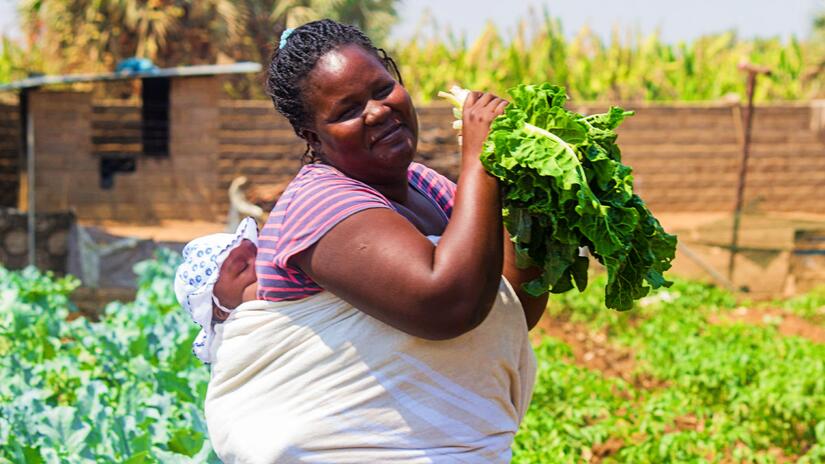Bending over her traditional clay cookstove, 38-year-old Lucky Mazangesure stirs the simmering ingredients in a small saucepan: fried-green bananas in stew of tomatoes and onions.
As the fire crackles, the scent of woodsmoke mixes with the savory-sweet aroma of the saucy, steaming treat. “Trust me,” she says, “after eating this banana dish you won’t be able to stop.”
She can’t resist a quick taste – just to make sure it’s coming out the way it should. “I really love cooking,” she says. “I like tasting the food while cooking. It makes me happy and it keeps my stomach full.”
Then she checks on some simmering beans and starts preparing another local delicacy: pumpkin porridge with roasted peanuts, which will be complimented by cooked spinach and broccoli.
This diverse meal does a lot more than keep her full, she adds. It gives her body the vitamins, minerals, proteins and carbohyrdates she needs to keep herself and her infant, nursing child healthy.
Like many new mothers here in Chibuwe, in southeastern Zimbabwe, Lucky is able to prepare these well-balanced meals thanks to a garden at the Chibuwe Health Clinic, which is tended largely by pregnant woman and new mothers who visit the clinic for pre-natal and post-partum care.
The garden got started several years ago as part of a larger initiative by the British Red Cross and the Zimbabwe Red Cross to set up gardens for expecting and new mothers at hospitals and local health clinics, where health workers were witnessing worsening nutrition levels among women and young children.
In a region hard hit by drought, windstorms, cyclones and flash floods, many legumes, fruits and root crops that are rich in vitamins, proteins and minerals are hard to get. Infant malnutrition here has been on the rise in recent years, with some estimates suggesting that roughly one-third of children under 5 are malnourished. Covid-19 has only aggravated the situation by disrupting regional and local food distribution systems.
“It’s hard for expecting mothers in this community to get a decent meal,” says Robert Magweva, a nurse at the Chibuwe Health Clinic, adding that too often, people must rely only on sadza [sorghum], a carbohydrate, and a limited range of leafy vegetables. “It’s a major challenge to have a well-balanced diet here. So the vegetables that are grown in the clinic garden help them to get a well-balanced meal.”
As a mark of the programme’s success, most of these gardens are now sustained entirely by the clinics, hospitals and the communities around them, with support of local agriculture experts and local Zimbabwe Red Cross volunteers.

An expectant mother gets a health check-up at the Chibuwe Clinic, Zimbabwe.
Photo: IFRC/Patrick Majarira
Better farming for a changing climate
Still, growing one’s own food in this environment is not easy. The climate has generally gotten hotter and drier, with dry spells punctuated by intense storms and winds, and unpredictable rains. Scorching heat evaporates water quickly and can easily whither young seedlings.
“At this clinic garden, we were taught smart agriculture techniques as a way of combating the effects that climate change was having on our harvest,” says Beauty Manyazda, another new mother who works regularly at the Chibuwe Clinic garden. “We learnt techniques such as conservation farming and mulching.”

New mother, Beauty Manyazda, holds up lettuces she has picked from the garden at the Chibuwe Clinic, Zimbabwe.
Photo: IFRC/Patrick Majarira
Conservation farming is an approach that aims to improve soil moisture and health by minimising the intensive tilling and plowing associated with large-scale crop production. Mulching is one very common conservation technique in which straw, leaves or other organic matter is laid down on the soil between the crops. This keeps moisture from evaporating, while discouraging weeds and providing nutrients to the soil as the mulch decays.
Such techniques are increasingly critical as climate change makes farming more difficult. “Our rainfall patterns have changed over the years,” explains Lucky. “We used to get rain in October, when we would sow the seeds for our crops. Now, we get rains in January. So the seeds we put in the ground get damaged waiting for the rainfall.”
Meanwhile, storms, droughts and heatwaves have become more and more intense, says Lucky. “Temperatures have continued to rise and this has resulted in regular, violent winds,” she notes. “These winds have destroyed our homes. We also get floods which also contribute to the destruction.”
Amid these challenges, the garden provides also provides other nourishing ingredients: the joy and satisfaction of being able to work and provide sustenance while also being among plants, close the soil with other women at her side.
“I love gardening,” says Lucky, her baby tied to her back, fast asleep as she picks a handful of chard. “The green nature of the garden warms my heart. With the garden, I know my family will always have a home-grown, nutritious meal.”
--
This story was produced and originally published by the Red Cross Red Crescent Magazine. To learn about the Magazine, and to read more stories like this, click here.

